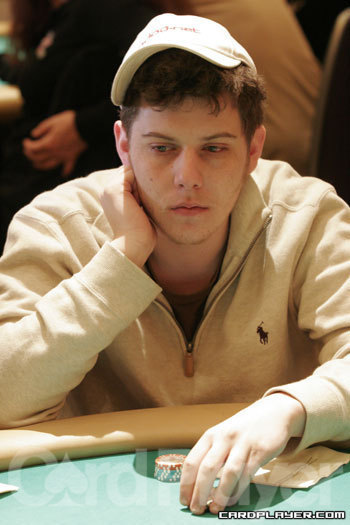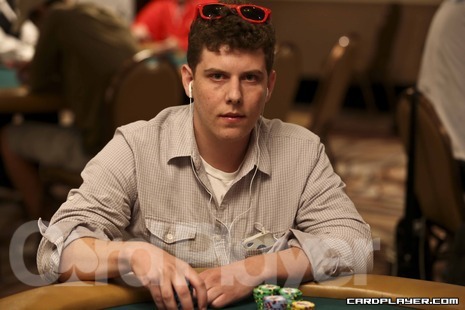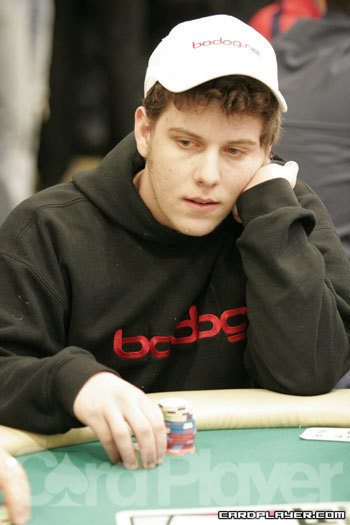






A Poker Life: Ari EngelEngel Currently Leading Card Player Player of the Year Race |
|
|

Many players attempt to reach the top of the poker world by exhibiting not only a brash confidence in their skills, but also a willingness to put it all on the line. As the greatest poker pros will attest to, you need to have a lot of gamble in you and almost a complete disregard for money if you want to beat the best. A few will make it, but the overwhelming majority won’t even come close.
But not everybody reaches the top with raw skills, reckless abandon, and sheer luck. Some guys, like Ari Engel, grind their way up with hard work, humility, and a conservative plan that eliminates nearly all risk of ruin.
In the world of tournament poker, Engel is a bit of an outlier. While others with lesser abilities have no problem putting up half their bankroll on any one tournament, Engel is a self-described bankroll nit, preferring an unadventurous approach that ensures he will be in the game for the long haul.
Engel has been a poker pro for more than a decade and has achieved many accolades. In addition to $3.2 million in lifetime live tournament earnings, he has also won millions more online and at one point was the top ranked online poker player in the world. He is currently tied for second place on the all-time World Series of Poker Circuit leaderboard with eight rings and now sits in first place in the Card Player Player of the Year race after winning the Aussie Millions main event in January.
Here’s a look at Alan “Ari” Engel.
World Traveler
 Engel was born in Toronto, Canada, but lived there for less than a year before his family packed up for what many would consider a drastic series of moves.
Engel was born in Toronto, Canada, but lived there for less than a year before his family packed up for what many would consider a drastic series of moves.
“I’ve lived all over,” Engel said. “I lived in South Africa for three years, Australia for eight years, Israel for a year, Maryland for two years, Chicago for high school, Israel again for another year, New York for college, and then Las Vegas for six years. After Black Friday, I moved back to Toronto to play online poker. These days, I don’t really have a place I call home since I’m traveling so much.”
Engel and his younger brother and sister were given a first-class education in world culture, but he doesn’t think his parents purposely intended to give him such an eclectic childhood.
“My dad is a rabbi and my mom is a Jewish studies teacher, so it wasn’t required that they traveled for their jobs, but it just kind of worked out that way,” he said. “I don’t think they intentionally set out to give my siblings and me a better understanding and look at the world, but that was definitely a byproduct of us moving around so much. Like any kid, I grew attached to certain places and moving was often difficult, but I think the benefits of having those experiences outweighed any negatives.”
When it came time to go out on his own, Engel chose New York to further his education.
“Going into college, I really didn’t have any idea what I wanted to do, but I was a competitive person and I had good grades, so my goal was just to get into the best school I could,” he recalled. “I had started day trading in high school for small amounts of money and the market was really good at that time, so I figured NYU business school was a good option because it was close to Wall Street.”
Poker Beginnings
Although he was dedicated to studying finance, it wasn’t long before Engel discovered poker thanks to a random roommate pairing with future poker player Andrew Brown, who won a WSOP bracelet back in 2008 and nearly won a second in 2012.
“He wasn’t the greatest student and ended up dropping out of college for poker, but he was a great player and I was fascinated watching him play online,” he admitted. “He would explain his thought process and I would pick up what I could. I played a little for low stakes, but it wasn’t until after I graduated that I started playing more.”
With a degree in his back pocket, Engel finally had the time to play some more poker. Once he started playing online, his game really took off.
“There was a $40 home game each week with my friends from school, and it was there that I learned about [the online poker site] Bodog. I got on, and all of a sudden I was crushing $2-$4 no-limit games. I quit my job, which wasn’t the job I wanted anyway, and I decided to try poker full time.”
You might think that the son of a rabbi would find some resistance from his parents when he told them he wanted to play poker for a living, but Engel says that wasn’t the case at all.
“If we go back in time 15 years and ask my parents what their dream profession would be for their son, professional poker player isn’t making the list of the top 1,000 options. We’re talking about extremely conservative backgrounds here. They would have every reason to not support me and it would be completely logical on their part to even discourage me from playing poker. Having said that, they couldn’t have been more supportive.”
Sacrificing To Be The Best
When Engel said he was going to play full time, he literally meant full time. He was dedicated to online poker, and in 2006 he not only won the Triple Crown Award twice, which is winning three major tournaments on three different sites over the course of a week, but he also reached the no. 1 ranking in the world.
 “In 2005, I ended up moving into the basement of this guy known as the landlord, who became a really good friend of mine,” he said. “After I won my first WSOP Circuit ring, I joked in the interview that it was the first time I had seen the sunlight in three years. But it was kind of a true statement. I spent those three years essentially doing nothing but playing online poker. It wasn’t a healthy lifestyle at all. I was eating terrible food and smoking two and a half packs a day, drinking a lot of soda, and never exercising. It was all about the poker, and I was a workaholic.”
“In 2005, I ended up moving into the basement of this guy known as the landlord, who became a really good friend of mine,” he said. “After I won my first WSOP Circuit ring, I joked in the interview that it was the first time I had seen the sunlight in three years. But it was kind of a true statement. I spent those three years essentially doing nothing but playing online poker. It wasn’t a healthy lifestyle at all. I was eating terrible food and smoking two and a half packs a day, drinking a lot of soda, and never exercising. It was all about the poker, and I was a workaholic.”
When asked why he decided to spend those years as a poker shut-in, Engel says that he felt he needed to make that sacrifice because the games were good and he wasn’t sure how long it would last.
“I’ve always been worried about the future of poker, and I kind of look at it like a professional athlete,” Engel explained. “These athletes have a very limited amount of time that they can make their entire life salary before their bodies won’t let them compete anymore. I didn’t think there was any chance I was going to play poker for the rest of my life, so in my mind, I was trying to win as much money as possible during that stretch to give myself a nice head start. As the years have gone on, I’ve realized that I’m not just in this for the short term and have become more pot committed to the idea of playing for a while.”
Making The Transition To Live Poker
Engel moved to Las Vegas, but not really to play more live poker. Along with David Chicotsky, he turned his house into a training facility for poker students. Despite all of the live poker options available to him, Engel’s faith made it difficult to play in a lot of bigger buy-in tournaments.
“Part of it was my comfort level,” he admitted. “I was definitely still more comfortable online and would really only play five or six events each summer. Another issue I had is that I wasn’t playing on Shabbat back then, which is the Jewish Sabbath or Saturdays. Obviously, given how long some tournaments can last, that really limited my schedule and event options. Over time, I’ve gotten less religious in my practices. It’s been a slow process, but I decided to make some exceptions here and there along the way to play certain events. I grew up as a very strict, completely Orthodox Jew, but eventually, I realized that I don’t have those exact beliefs anymore.”
Engel got off to a fast start before Black Friday by winning a couple of WSOP Circuit rings. Then they introduced the WSOP National Championship, which only encouraged Engel to stay on the WSOP Circuit in order to qualify. As a result, he has since won eight rings, which is tied for second on the all-time rankings with Chris Reslock, just behind Alex Masek.
A Conservative Approach
While some poker players in the past have used WSOP Circuit success as a launching point before playing bigger buy-in tournaments, Engel hasn’t strayed too far.
“The buy-ins have always been a good selling point for me as a bankroll management nit, to be honest. I’m not even really proud of it. I know its cost me in the past, but because of my very conservative background, I’ve always played smaller than others might have given my bankroll and level of success. Part of it is confidence-related issues. If I hit a big score and then lose a few tournaments in a row, I’m very quick to drop back down again to the lower stakes where I feel more comfortable. If it comes down to a €5,000 EPT tournament or a $1,500 WSOP Circuit tournament in Iowa, I’m usually going to go with the softer tournament with the bigger ROI.”
 Yes, it’s true that cautious bankroll management has kept Engel out of trouble, but he’s also quite aware that it’s probably cost him some money over the years as well.
Yes, it’s true that cautious bankroll management has kept Engel out of trouble, but he’s also quite aware that it’s probably cost him some money over the years as well.
“I’ve always known that my conservative nature has probably held me back as a poker player,” he said.
“There are poker players who have achieved more simply because they don’t mind putting more on the line. But I think it’s really important to play in your comfort zone. Some people don’t mind losing it all, and then finding a backer to keep playing, but that’s not me. It would be devastating to me and I don’t think I can handle that. It took unbelievable luck at the beginning for me to win often enough to make this my profession. If my poker career had started out by running up $10,000 and then losing it all, there is zero chance I’d still be a poker player today.”
The Big Score
It’s hard to believe for someone with so many millions in earnings, both live and online, that Engel hadn’t really experienced a huge, life-changing payday in his career. For the most part, he had grinded his way to a sizable bankroll four or five figures at a time.
Along with his Circuit titles, Engel had also won a Heartland Poker Tour main event, the Punta Cana Poker Classic, the Empire State Hold’em Championship, and the high roller event at the APT Philippines, but never had a score larger than about $180,000. Then in January of 2016, he traveled to Melbourne for the Aussie Millions. After making two preliminary final tables, he took down the AUD$10,000 main event, topping a field of 732 players and banking $1,120,000.
With even more bankroll security than ever, Engel could justifiably plunge head first into the shark-infested waters of the high roller circuit, but he’s not sure that’s what he wants to do.
“I’m still trying to figure out how it’s going to affect me and my plans. There are taxes to consider. Because I started the year off with a big score, it benefits me to take bigger shots this year than it would in a different year, for example. I was really comfortable before the win and there’s not much out there in terms of material possessions that I really want. I travel everywhere with two suitcases, so acquiring things doesn’t really appeal to me or work with my lifestyle. I just have to stay focused on my game and keep plugging the leaks, and we’ll see how it all ends up.” ♠
